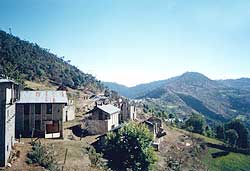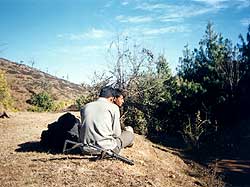 Seven years after the Maoists launched their armed struggle in these hills of western Nepal, war-weary villagers are hoping against hope that the ceasefire this time is for real. When the truce was announced by radio on the night of 29 January, it was greeted with whispers in dark streets silenced by curfew. Two weeks later, there is watchful hope here in Khalanga, the district headquarters of Salyan district.
Seven years after the Maoists launched their armed struggle in these hills of western Nepal, war-weary villagers are hoping against hope that the ceasefire this time is for real. When the truce was announced by radio on the night of 29 January, it was greeted with whispers in dark streets silenced by curfew. Two weeks later, there is watchful hope here in Khalanga, the district headquarters of Salyan district.
Villagers displaced by the fighting haven't yet mustered the courage to return to their homes. The security forces still have their checkpoints, the army and police walk warily on joint patrols, the 8PM-4AM curfew is still on. Khalanga goes quiet after four in the afternoon and the fortified district headquarter still has the look of a town under siege. Rajendra Dhakal, Salyan police chief tells us, "We have been fooled in the past, so we are still on high alert. We can't trust the Maoists."
Outside Khalanga, a group of plain-clothed armed Maoists look relaxed as they patrol the trail. They stop by to chat. "The talks will be successful and Nepal will become a peoples' republic," says one of them, munching on roasted bhatmas, as a captured army sub-machine gun dangles from his shoulder.
The lack of trust is mutual. Platoon commander Badal who takes orders from the Maoists' First Battalion in Mangalsen recalls that his comrades were arrested by the police in Pyuthan during the 2001 talks and later disappeared. "We will watch the government's attitude first," he says. This time, the Maoists look like they are preparing to use the truce and dialogue period to strengthen political programs in case they have to join the mainstream. At present they are preparing for nationwide commemorations of the seventh anniversary of the start of the "peoples' war" on 13 February.  The houses along the trail have freshly painted slogans with an ominous message: "We want constituent assembly elections, interim government and a roundtable conference, or else."
The houses along the trail have freshly painted slogans with an ominous message: "We want constituent assembly elections, interim government and a roundtable conference, or else."
Samar, is a Maoist political activist from Jugar, and he is more moderate in his views. "We will accept the result of the constituent assembly elections, even if it is in favour of constitutional monarchy," he tell us. "We will then continue to convince people through peaceful means." Samar says he hadn't received any written orders from the party high command, and his source of information is the radio.
We trek from Saigha in Dang to Holeri in Rolpa, past the ravages of famous battles to Khalanga. There isn't a single person on the trail who does not support the ceasefire. "When we heard it on the radio, we couldn't believe our ears," says Man Bahadur Sahu, in the village of Rim. "We waited so long for this."
Further up, near Triveni, a young woman is singing a folk song as she collects fodder at the edge of the forest. The words go, "When will my beloved return to me?" She is happy the fighting is over, and doesn't even want to think about it starting again. Acting Salyan CDO Mohan Akela says he won't let anyone disrupt the ceasefire, adding that if the Maoists are not armed they can come to the district headquarters.
Villagers are hopeful, but suspicious of the Maoists' real intentions. "We can't trust the Maoists even if the talks succeed," says Dhan Bahadur Hamal, of Marmapari Kada, who fled his village and has been living in Khalanga for the past five years. "We will go home only if the Maoists disarm and vow that they will not murder and extort anymore," he adds.
Nirmala Rathour's husband is a policeman with the paramilitary, and she has been worried about his safety. Despite the ceasefire, she is nervous and still unsure if she will ever see her husband again.  "After all, they double-crossed us before," she says. We put that to a local Maoist activist, who identifies himself as Rohit. "We will fight during the time of war. Otherwise, policemen can come here and lead a normal life," he promises us. But this doesn't assuage the fear of students like Bishnu Sharma of Kavra and Amar Bahadur Pun of Badagaon. "They can't be trusted," says Bishnu simply. Amar Bahadur agrees, "They never practice what they preach." But even the fact that women, students, officials, farmers and the Maoists are talking so openly is already a sign that the situation is more relaxed, and if real peace is restored things will be back to normal in no time.
"After all, they double-crossed us before," she says. We put that to a local Maoist activist, who identifies himself as Rohit. "We will fight during the time of war. Otherwise, policemen can come here and lead a normal life," he promises us. But this doesn't assuage the fear of students like Bishnu Sharma of Kavra and Amar Bahadur Pun of Badagaon. "They can't be trusted," says Bishnu simply. Amar Bahadur agrees, "They never practice what they preach." But even the fact that women, students, officials, farmers and the Maoists are talking so openly is already a sign that the situation is more relaxed, and if real peace is restored things will be back to normal in no time.
Seven years ago, many in this neglected and abandoned region of Nepal believed that liberation was at hand. But as the attacks mounted and the state used strong-arm tactics to nip the revolution in the bud, the violence spun out of control. The truce two years ago was followed by even more brutal fighting as the army was dragged in, and that explains the wariness with ceasefires agreed upon in distant Kathmandu.
The mid-western regional office of the human rights group, INSEC, says 1,174 persons have been killed in Rolpa district alone during the last seven years. Of them, 992 people were killed by the security force whereas 182 people (including security personnel) were killed by the Maoists. In neighbouring Salyan district, the security forces have killed 159 people while the Maoists killed 65 people. Those killed in Salyan by the Maoists include 12 Nepali Congress cadre and three UML supporters.
With much accumulated bad blood, political parties which have had their local cadre base decimated are most skeptical about the ceasefire. Lok Bahadur Dangi of the UML's district committee says he is still taking a wait-and-watch move. President of the Nepali Congress Salyan district, Dilli Raj Regmi, is more realistic. "It will take at least six to seven months for people to return to their villages," he tells us.
Despite the brutality, loss and trauma there are plenty of people in Salyan who want the ceasefire to be a new beginning. Surprisingly, those who yearn the most for peace are the ones who have lost near and dear ones, like Dhan Bahadur Hamal whose 17-year-old son was abducted and killed by Maoists four years ago. "He won't come back," he tells us, "but at least if peace is restored we can live without fear."
The Khalanga jail still has detainees, and dozens of people remain in Maoist custody, including radio journalist Dhana Bahadur Rokaya of Radio Nepal, Surkhet. In Rukum, a meeting of political parties has made public names of 26 people abducted by the Maoists.
Across the western districts, the Maoists have been holding open meetings displaying their captured weapons, including grenade launchers, in marchpasts. In one such meeting near Tulsipur this week, we listened to Comrade Barta tell the people, "If the government cheats us again, we'll repeat the victories of Ghorahi, Syangja and Salleri."
Local political activists are apprehensive about the open display of weapons. Said Shrimani Acharya of the UML, "Even after the ceasefire, people are forced to live in fear of guns. The talks can't succeed unless both the parties are honest about peace."
Development has been at a standstill, and despite the ceasefire there is not a hint that any kind of massive relief or rehabilitation drive is going to start anytime soon. Dang, Rolpa and Rukum were always underdeveloped, but most villages had sub-health posts and post offices. In the past four years, Maoists have systematically destroyed 271 VDC buildings, 138 post offices, 16 health posts and 29 bridges. All three districts had phone lines, and all have been cut off since the Maoists destroyed telecom towers.
Had it not been for the fighting, Rolpa, Rukum and Salyan link roads would have been built by now. Today, most of these districts are as inaccessible as ever. Salyan Congress president, Regmi, says the VDCs will have to invest their next three years' budget just for reconstruction of infrastructure. Multiply that across the country, and it is clear that the fighting has set the country back at least 20 years.
(Top Bahadur Khadka in Rukum and Sharad Adhikari in Dang contributed to this report.)
RELATED ARTICLE
"Maybe this time there will be peace." >>


